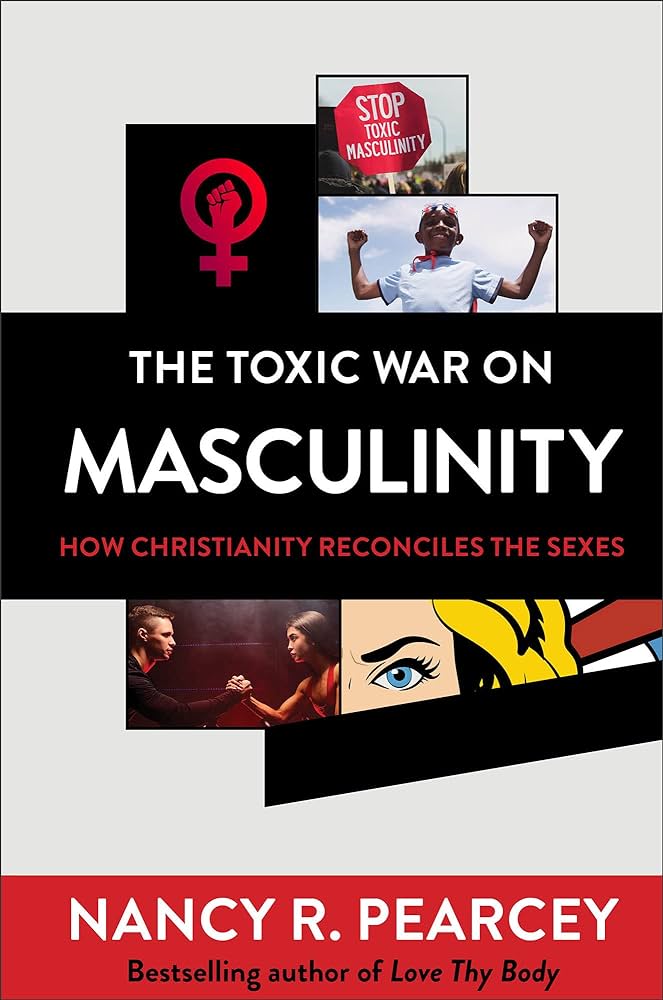In Context
Men are important, especially as fathers. Children with absent fathers count for 63% of youth suicides, 90% of homeless and runaway children, 85% of children with behavioural disorders, 71% of high school dropouts, and 85% of imprisoned youths. [192-3] And yet our culture seems to be at war with the very force it arguably needs more of: masculinity.
Ours is a culture that has fallen into a default mode of either denigrating manhood or promoting models of manhood that are seriously misguided. This becomes a big social problem. As Pearcey says, “When an educated culture routinely denigrates masculinity and manhood, then women will be perpetually stuck with boys, who have no incentive to mature or to honor their commitments.” [23] How did our culture go from honoring men and manliness to constantly denigrating masculinity as toxic, and infantilising men? Pearcey explains how this came to be and what we can do to recapture a tradition of positive manliness.
Big Ideas
- The industrial revolution is the source of the turning point of our views on masculinity because men were taken from the home
- There is a big difference between the so-called real man of the “secular script” and the good man of the Bible
- Most women did not initially support women’s suffrage because they thought it undermined the marriage and family bond
- Christian men who attend church regularly have the lowest rates of divorce, the happiest wives, and the lowest rates of domestic violence
- To recapture a virtuous family life and good male-female relations we must reinvigorate, as much as possible, the work-from-home model
Biblical Manliness
According to Genesis, the division of humanity into male and female is “very good”, and both male and female reflect God’s image (Gen. 1:27-28). Furthermore, God’s original commandment was for humankind, male and female, to “create cultures, to build civilizations, to make history.” God gave humankind a mission. Speaking of men, every man is born with a mission to carry out God’s command. The problem is, as Pearcey says, the model of manhood that the Bible sets out has been set aside by secular culture for an alternative that makes fulfilling this mission well-nigh impossible.
Pearcey distinguishes between the so-called “real” man and the good man. The “real” man is the stereotypical man of secular culture: tough, cashed-up, philandering, dangerous, free of responsibility. The good man is the model of man we find in the Bible, which also happens to be the kind of man who is statistically most happy: godly, hard-working, protective, self-sacrificial, and family-oriented. [21] Although throughout Christian history the headship of the husband and father was affirmed, male tyranny was always condemned. Speaking of historical handbooks on a good household Pearcey says “every treatise on household organization [overwhelmingly written by men] cautioned against dictatorial male rule.” [79]
The Bible offers a model of “the good man”, that is, the man who “channels his strength to protect and provide for his household and his community.” [81] This is what historians have called “communal manhood”.
The Industrial Revolution
The great shift in attitudes regarding men (and women) begins during the Industrial Revolution (IR) stretching from the 18th century and throughout the 20th century. Prior to the IR work and family were integrated, with father figuring prominently in both. Most families throughout America and Europe lived on a parcel of land and worked together to ensure their own survival: farming, repairing, and laboring, with many women earning extra income from spinning cotton. Men were home and were full-time providers and fathers, exerting spiritual and moral authority and influence over their households.
With the IR families were shifted off the land and came to make ends meet by one or two parents entering into factories to work for the 12-hour day, and later driving into cities from suburbs to work all day. As Pearcey says, prior to the IR “the family enjoyed an integration of life and labor that was lost after the Industrial Revolution, when work was removed from the home and transferred to factories and business offices.” [75] The work-family nexus was broken and fathers were present briefly in the morning and briefly at night. The moral and religious education and leadership of the household increasingly fell upon mothers. Increasingly women were seen as the moral and spiritual centre of gravity and men seen as those who needed civilizing and feminine spiritual leadership. Thus, the seeds for modern talk of “toxic masculinity” were sewn.
The turn against men can be seen in shifting opinions over the decades [71]
| Opinion on men over the years | 1970 | 2005 |
| “Men are basically kind and considerate”
“Men’s egos require that they put women down” “All a man really wants from a date is to go to bed” “All a man is really interested in is his career, not his family” |
65%
41% 44% 39% |
44%
58% 71% 56% |
It is a little-known fact that many women were staunchly opposed to extending the vote to women. Not because they were misogynistic, but because they saw that it was an assault on the unity of the family under the man’s headship, and it also signified, in Pearcey’s words, “a shift from the household to the individual as the basic unit of society.” [100] The suffragist movement partly succeeded because of changed views regarding men out of the cultural effects of the IR. As Alice Henry, a leader in the Women’s Trade Union League said at the time, female suffrage is necessary “because men, even good men, cannot be trusted to take care of women’s interests.” [100]
The myth of the oppressive Christian patriarch
There is a prevailing myth that religious men, Christian men in particular, are more likely to be dangerous to women. All the research points to the exact opposite conclusion. The truth is that the religiously devout men who attend church are the most likely to be good husbands and fathers, whereas those who merely identify as religious but are not devout or church-going (nominals) are the most likely to be bad husbands and fathers. Pearcey says “active evangelical men are 35 percent less likely to divorce than secular men” while “nominals are 20 percent more likely to divorce than secular men.” [37] The research of American sociologist Brad Wilcox is decisive, showing that “73 percent of wives who hold conservative gender values and attend religious services regularly with their husbands have higher-quality marriages.” [39] Evangelical Protestant men have the lowest rates of domestic violence of any group in the United States. [42] Also, “highly religious couples enjoy higher-quality relationships and more sexual satisfaction.” [41] Religiously active fathers also spend around 3.5 hours more time with their children than secular fathers. [41] Pearcey concludes:
Across all denominations, the evidence from the social sciences is overwhelming: A biblical view of manhood provides a powerful incentive to male valor and a restraint on male vice. We should be bold in bringing it into the public square as a real-world solution to the issue of toxic behavior in men. [47]
The way forward
Key to moving forward with families and manliness is to recreate “a workplace culture that values the family as much as it values professional achievement.” [213] As Pearcey points out, research shows that more family-integrated men make for more productive workers. One obvious way of recapturing work-family integration is for workplaces to create more tele-work opportunities so men can work more from home – something Covid showed was possible and also desirable. As Pearcey says, “It was the industrial economy that drove men out of the home; it could be the post-industrial economy, with its advanced technology, that will bring men back.” [216] Another pathway is for a revival of the family business, where families work together, especially from home. Again, modern technology has made this possible: “By working from home, parents avoid depleting time and mental energy that could be applied to more productive activities with their families.” [221] Of course, these options are not available to everyone.
There is no simple solution to the present trend of denigrating men. Perhaps the easiest way to start, however, is to hold men to high standards and expectations. For example, “If men are repeatedly told they are naturally less religious, eventually they will begin to believe the cultural narrative. Like all of us, men tend to rise or sink to the expectations placed on them.” [117] We ought also to stop talking about feminine qualities and masculine qualities, as though women as women cannot be strong and brave, and men as men cannot be nurturing and emotional. Such talk only reaffirms a sense that a man is giving up his manhood if he expresses anything other than a tough exterior.
Commentary
The Toxic War on Masculinity is a rich and wide-ranging book, drawing on insights from history, literature, sociology, economics, philosophy, and the Bible. It is at once a very sympathetic book towards men but at the same time holds men to the highest standard – the example of Jesus himself. Notwithstanding the explicitly Christian approach of the analysis, The Toxic War on Masculinity will be immensely illuminating for anyone, religious or not, who sincerely wishes to understand the origins of the present anti-male discourse in our culture, but also wants to understand alternative ways of thinking and practical paths to reclaim an integrated work-family life. Pearcey’s book is an excellent step towards reclaiming true manliness from purveyors of anti-masculine ideologies. Ideologies that see men as inherently suspect, or whose conception of a “real” man resembles more the fantasy of a 14-year-old boy than that of a good man who can fulfill his God-given mission in this life.




